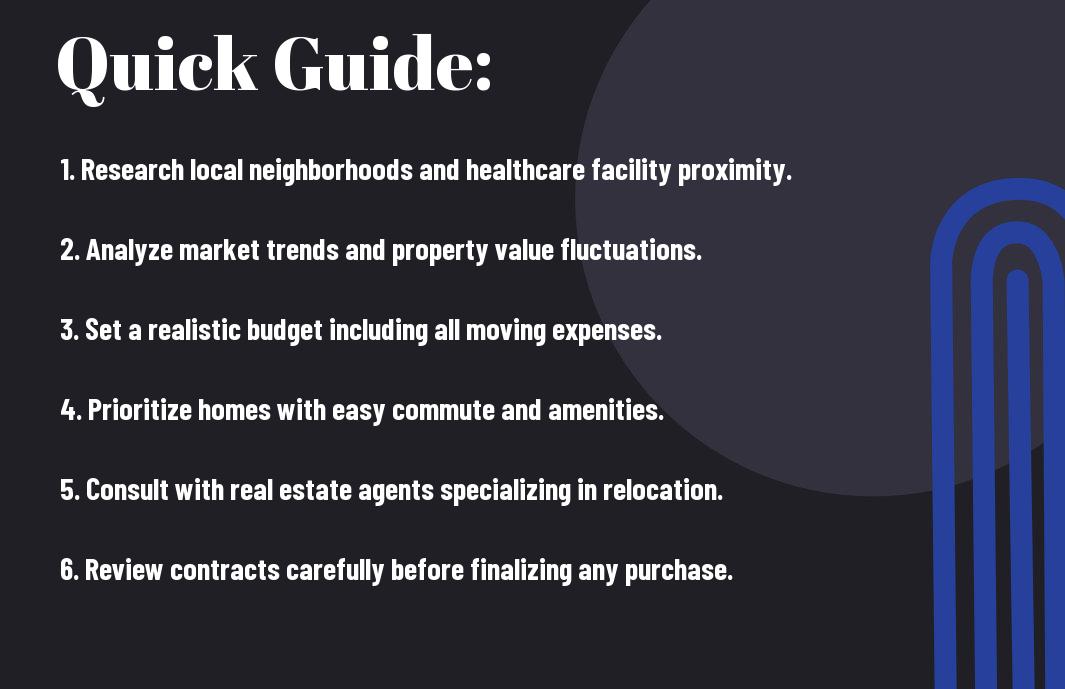You are about to begin on an exciting new chapter in your career, and understanding the real estate market is important for making a smooth transition. This guide will provide you with valuable insights tailored specifically for healthcare professionals like yourself, helping you navigate the complexities of buying or renting a home in a new location. With tips on assessing market trends, choosing the right neighborhood, and making informed financial decisions, you’ll be well-equipped to secure a home that meets your needs and supports your professional ambitions.

The Economic Forces Driving Real Estate Trends
Understanding the economic forces that shape real estate trends is necessary for making informed decisions. Factors such as employment rates, wage growth, and overall economic health play a significant role in influencing housing demand and supply. As a healthcare professional relocating, recognizing these trends can guide you in selecting the right location that aligns with your career growth and personal lifestyle.
How Supply and Demand Shape Prices
Real estate prices are fundamentally driven by the balance of supply and demand. In areas where employment opportunities flourish, such as hospitals and clinics, demand surges, pushing prices upwards. Conversely, an oversupply of properties in less desirable areas can lead to price stagnation or declines. In your search for a new home, analyzing these local market dynamics aids in identifying optimal investment opportunities.
The Impact of Interest Rates on Market Dynamics
Interest rates wield significant influence over the real estate market by affecting mortgage affordability for buyers. When rates are low, borrowing becomes cheaper, leading to increased demand for homes. This heightened demand often results in rising prices. Conversely, when rates rise, fewer buyers can afford homes, which may lead to price reductions, putting sellers in a challenging position.
For example, during 2020, the Federal Reserve slashed interest rates to historic lows to stimulate the economy, prompting a surge in homebuying. Many potential homeowners took advantage of the low rates, leading to bidding wars and rapid price increases. Conversely, as rates began to climb again in late 2021, buyer enthusiasm waned, causing a slowdown in sales and stabilizing prices in many areas. As you navigate your move, keep an eye on interest rate trends, as they directly impact your purchasing power and the overall market climate.

Neighborhood Insights: Where to Settle
Choosing the right neighborhood can significantly impact your overall satisfaction and work-life balance as a healthcare professional. You’ll want to consider factors such as proximity to your workplace, commute times, local amenities, and community atmosphere. Areas like family-friendly suburbs might offer parks and schools, while urban settings might provide vibrant nightlife or cultural attractions. By understanding the unique characteristics of various neighborhoods, you can ensure that your new home aligns with your personal lifestyle and professional needs.
Evaluating Community Resources for Healthcare Professionals
Access to community resources plays a vital role in your decision-making process. Nearby hospitals, clinics, and wellness centers enhance your ability to engage in professional development and networking opportunities. Additionally, consider the availability of educational resources, such as libraries or training facilities, and recreational options like gyms and parks that promote a healthy lifestyle. The strength of a local healthcare community can foster connections and enhance your career growth.
Understanding Local Real Estate Markets and Their Fluctuations
Local real estate markets can fluctuate widely based on supply, demand, and economic trends. Analyzing these factors allows you to make informed decisions about when to buy or rent. For example, a market experiencing growth may offer higher property values, while a declining area could present opportunities to purchase homes at a lower cost. Understanding the historical trends and forecasts can give you an edge in finding the right home. Local market reports, trends in housing inventory, and average days on the market can all provide valuable insights as you navigate this competitive landscape.
Navigating the Home-Buying Process
Embarking on the home-buying journey can be overwhelming, particularly if you’re relocating to a new area. Familiarizing yourself with the steps involved in this process will empower you to make informed decisions. You’ll need to consider your budget, the type of home you want, and the neighborhoods that best suit your lifestyle. Additionally, understanding the role of inspections, appraisals, and closing can save you time and money in the long run.
Essential Steps for Securing Financing
Securing financing is a key step in the home-buying process and typically involves getting pre-approved for a mortgage. You’ll need to gather financial documentation such as tax returns, proof of income, and bank statements. Since lenders look at your credit score, ensuring it’s in good shape will help you secure better loan terms. Additionally, understanding different loan options available to you can enhance your financial flexibility, allowing you to choose a mortgage that best aligns with your financial plans.
Tips for Finding the Right Real Estate Agent
Selecting an expert real estate agent can streamline your home-buying experience. You should look for agents with a solid track record in your desired area and those who specialize in working with healthcare professionals. Ask for referrals or seek out reviews online to gauge their expertise. Meeting potential agents to discuss their strategies and communication styles will further help you find a suitable match. Moreover, consider their market knowledge and experience with navigating any legal aspects involved in your purchase.
- Ask for recommendations from peers in your profession.
- Review online ratings and testimonials.
- Conduct interviews with multiple agents to find the best fit.
- Trust your instincts about the agent’s communication style.
Knowing how well an agent understands your unique needs can significantly impact your home-buying journey. It’s beneficial to select someone who not only knows the market but also comprehends the lifestyle demands of healthcare professionals, including proximity to work and important amenities.
- Check if they have experience with first-time homebuyers.
- Look for someone who actively listens and responds to your preferences.
- Ensure they are familiar with the specific neighborhoods you are interested in.
- Inquire about their negotiation strategies and past successes.
Knowing these factors enables you to evaluate potential agents effectively, ensuring you have the right support throughout your home-buying process. Building a strong relationship with your agent will not only provide peace of mind but also help you navigate any complexities that may arise during your search for a new home.
Housing Types: Pros and Cons
Understanding the various housing types available can help you make an informed decision that aligns with your lifestyle and financial goals. Below is a breakdown of the pros and cons of different housing options to guide you in selecting the best fit for your needs.
| Housing Type | Pros | Cons |
|---|---|---|
| Single-family Homes | Privacy, ownership, potential for appreciation | Higher maintenance costs, longer commute times |
| Condominiums | Lower maintenance, amenities, community security | HOA fees, less privacy, potential for stricter rules |
| Townhouses | Private outdoor space, community feel | Shared walls, possible HOA fees |
| Multi-family Homes | Income potential, shared expenses | Management duties, tenant issues |
| Rental Properties | Passive income, property appreciation | Market volatility, management responsibility |
Single-family Homes vs. Condominiums
Single-family homes offer more privacy and space, making them ideal for families or those who prefer solitude. However, they come with higher maintenance responsibilities. Condominiums, on the other hand, often provide a host of amenities and lower upkeep, but they may impose homeowners association (HOA) fees and have restrictions on property use. Evaluating your lifestyle preferences and budget will help you choose the right option.
Rental Properties as an Investment Opportunity
Investing in rental properties can be a lucrative way to generate passive income while also benefiting from property appreciation. As a healthcare professional, you might consider purchasing a property that offers both living space and potential rental income, allowing you to make the most of your investment. Rental properties can diversify your income streams and provide a financial cushion, giving you more freedom and flexibility in your career.
Many healthcare professionals find that investing in rental properties yields significant returns. According to recent studies, the average annual return on investment for rental properties can range from 8% to 12%. Additionally, as you become more familiar with the local market, you can make strategic decisions about property improvements that can boost rental value. Much like providing quality patient care, managing a rental property successfully requires attentiveness and adaptability, but the financial rewards can lead to greater stability and opportunities for growth in your career and life overall.
The Emotional Side of Relocation
Relocating for your career, especially in the healthcare field, can invoke a whirlwind of emotions. From the excitement of new opportunities to the anxiety of leaving familiar surroundings, the emotional aspects often catch you off guard. Acknowledging these feelings is the first step in navigating this life-altering transition. It’s normal to grapple with issues like homesickness or uncertainty about fitting into a new community, ultimately affecting your professional performance and personal well-being. Embracing the emotional journey as part of the overall relocation process can foster resilience and a renewed sense of purpose.
Managing Stress in Transitioning to a New Community
Transitioning to a new community can trigger stress, but actively managing it can lead to a smoother adjustment. Engage with your new environment by exploring local amenities, attending community events, and participating in outdoor activities. Setting small, achievable goals each day helps to create a sense of normalcy. Practicing mindfulness techniques such as deep breathing or meditation can also help alleviate stress and ground you in the present moment, making the change feel less daunting.
Building a Support System in a Foreign Environment
Forming connections in a new place is vital for emotional well-being. Start by reaching out to colleagues at your workplace; they can provide insights into the local lifestyle and introduce you to others in the area. Social media platforms and local community groups, even those centered around hobbies or interests, can also be excellent resources for meeting new people. Joining clubs or volunteering opportunities can further help you establish a network and create lasting friendships.
Building a support system goes beyond just social connections; it’s about creating a sense of belonging in your new environment. Engage with neighborhood groups, community centers, or religious organizations where you can meet individuals with similar interests or backgrounds. Researching community events or classes could lead you to people who share your hobbies, making it easier to foster friendships. Establishing relationships with neighbors can also offer not only companionship but practical support, such as recommendations for local services or activities. No matter where you go, these connections will help ease the transition and enhance your new experience.
Summing up
Now that you have a comprehensive understanding of the real estate market tailored for moving healthcare professionals, you can navigate your housing options with confidence. By exploring local trends, assessing your needs, and considering financial factors, you can make informed decisions that align with your lifestyle and career. Take the time to research your potential neighborhoods and seek expert advice when necessary. This approach will ensure that your transition is smooth and that you find a place that truly feels like home.




